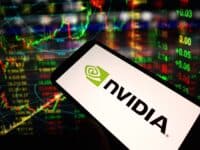The technology train keeps rolling, and despite the fact that the overall market is trading at a stiff 18 times trailing earnings, many of the top technology stocks to buy are at much more tolerable multiples. A new report from Steve Milunovich and his outstanding technology team at UBS points out that while currency headwinds did have an effect on some top tech companies’ first-quarter earnings and multiples have expanded, the sector still looks fairly reasonable, especially compared to utilities and consumer staples. Source: Thinkstock
Source: Thinkstock
The UBS favorite tech stocks to buy share a common link as they are all among the leaders in their specific technology silos. Again, with a pricey market, these top stocks to buy make good sense in an aggressive growth portfolio.
Cisco Systems
This stock trades at a very low 13.4 times estimated 2015 earnings. Cisco Systems Inc. (NASDAQ: CSCO) boasts an outstanding 7.44% free cash flow yield. The networking giant also seems to have fought through numerous headwinds, including up and down demand from telecom carriers, weakness in emerging markets and threats to its very lucrative switching business, and it recently delivered another solid quarter of earnings. The company also stands to benefit from a better corporate spending environment in Europe, as well as continued growth here at home.
Cisco recently won an important contract for the Verizon build out of the company’s next-generation 100G metro network. While Cisco’s optical business is small as a part of total revenue, this win is seen by Wall Street as a significant endorsement of the investments Cisco has made into its optics business.
After 20 years of leading the Silicon Valley giant, John Chambers recently announced that Chuck Robbins will become the next chief executive of the world’s biggest networking equipment company when he steps down as CEO. That should keep things going smoothly. Two other senior management employees will be leaving in late July. Many believe this could pave the way for new blood and a fresh direction at Cisco, which was also one of our top stocks to own for the next decade.
Cisco shareholders are paid a 2.88% dividend. The UBS price target for the stock is $33, and the Thomson/First Call consensus target is $31.03. Shares closed Thursday at $28.61.
ALSO READ: Big Upside Into and After Hewlett-Packard Breakup
EMC
This company is trading at an incredibly low 14.16 estimated adjusted 2015 earnings, versus 15.1 for 2014. EMC Corp. (NYSE: EMC) is the leader in storage, and the constant increase in data makes the stock a core holding for technology investors. With the company expected to buy back $3 billion of stock in 2015 and the lower VMware numbers baked into future calculations, now may be a good time to add shares of this outstanding technology stock.
Some on Wall Street are not thrilled with the progress the company is making, and have said the stock was “dead money.” They argue that until numerous catalysts kick in, the stock will go nowhere. The company recently announced it plans to acquire global cloud service provider Virtustream in an all-cash transaction of approximately $1.2 billion. The transaction is expected to close in the third quarter of 2015. Early reaction to the deal is very positive.
EMC investors are paid a 1.7% dividend. The UBS price target for the tech giant is $28.50, and consensus target is $30.45. EMC closed Thursday at $27.01.
ALSO READ: 5 More Semiconductor Merger Candidates After Altera
Fortinet
Fortinet Inc. (NASDAQ: FTNT) is well liked on Wall Street and analysts have pointed to specific reasons for the bullish posture:
- The large push into enterprise and OMP
- The impact of the improved inventory management
- The new “Easy 4” pricing model released earlier this year, which involves a new bundled product sales strategy
Fortinet shareholders cheered in April as the company posted first-quarter earnings that beat expectations, forecast revenue during the quarter was higher, and management raised its year outlook above consensus. Wall Street also cheered as the company said the tone of business is very strong and CEO Ken Xie believes demand for network security software solutions is the strongest “in 20 years.”
The UBS price target is set at $45, and the consensus objective is $41.09. Shares closed Thursday at $39.50 apiece.
Hewlett-Packard
This old-school tech stock has been sold off hard as investors feel that the slowdown in personal computer (PC) sales could continue to hurt earnings. Hewlett-Packard Co. (NYSE: HPQ) stock is down a whopping 16% year to date and trades at a very low 9.3 times 2015 estimated earnings. Some Wall Street analysts feel that weak PC demand could continue to negatively impact revenue and free-cash-flow at the company. The recent decline in the stock may represent investors already discounting what could be a slow year at the Silicon Valley icon. HP does a large 65% of sales to foreign accounts, and the dollar may have topped out after a long run, which could help in the second half of 2015.
The server business is where many top analysts on Wall Street are bullish, and by adding in the firm’s very solid printer business, investors may be well advised to look at this stock at current lower trading levels.
HP investors are paid a 2.07% dividend. UBS has a very solid $40 price target for the stock. The consensus target is posted at $40.47. Shares closed Thursday at $33.30.
ALSO READ: Deutsche Bank’s 3 Top Tech Stocks to Buy Before the Market Corrects
Juniper Networks
This is a solid technology stock that has been on a long roller-coaster ride for investors over the past two years. Juniper Networks Inc. (NYSE: JNPR) has seen the combination of positive activist shareholder moves combined with a solid product cycle that has made the stock a recent favorite again. The company’s trip to the woodshed last year may be just the ticket for investors looking to buy some, despite the big move made off the lows that were printed last fall. Juniper has a big presence in network and enterprise security and could possibly be a merger or takeover target.
Juniper and Mirantis announced in March an expanded engineering partnership that provides customers with a reliable, open-source software-defined networking (SDN) fabric to deploy OpenStack clouds at scale. According to a recent report by 451 Research, the OpenStack market size is estimated to reach $1.7 billion by 2016. Enterprises and service providers are increasingly looking to open-source software for its increased flexibility, cost savings, no vendor lock-in and the ability to customize integration with other infrastructure and applications.
Juniper investors are paid a 1.6% dividend. The UBS price objective is $28. The consensus target is lower at $26, and the stock closed above that Thursday at $27.15.
Palo Alto Networks
This company has been a momentum trader’s dream over the past year and continues to show up well with resellers. Palo Alto Networks Inc. (NASDAQ: PANW) was reported to have the highest percentage share in the highly competitive firewall bake-offs at 42%. The company also ranked highest with the Wildfire product, which was the favorite in the Advanced Persistent Threat space among the value added resellers with 43%.
The company is helping to lead a new era in cybersecurity by protecting thousands of enterprise, government and service provider networks from cyber threats, and it boasted a staggering year-over-year billing growth. Unlike fragmented legacy products, its security platform safely enables business operations and delivers protection based on what matters most in today’s dynamic computing environments: applications, users and content.
UBS has a $166 price target, much lower than the consensus target of $181.70. The stock closed trading Thursday at $168.75.
ALSO READ: 5 Tech Stocks With Very Positive Earnings Revisions
The UBS team is sticking with the big guns in the industry, and it is wise for technology investors to do the same. With a brewing storm perhaps on the way, these stocks should hold up better in a downturn.
Take This Retirement Quiz To Get Matched With A Financial Advisor (Sponsored)
Take the quiz below to get matched with a financial advisor today.
Each advisor has been vetted by SmartAsset and is held to a fiduciary standard to act in your best interests.
Here’s how it works:
1. Answer SmartAsset advisor match quiz
2. Review your pre-screened matches at your leisure. Check out the
advisors’ profiles.
3. Speak with advisors at no cost to you. Have an introductory call on the phone or introduction in person and choose whom to work with in the future
Take the retirement quiz right here.
Thank you for reading! Have some feedback for us?
Contact the 24/7 Wall St. editorial team.



